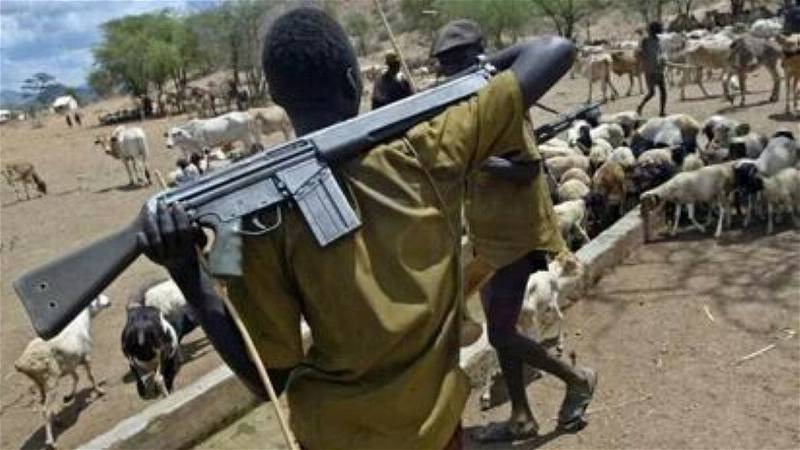
IMEKO AFON – A traditional chief was reportedly killed by Fulani herdsmen in Nigeria’s southwestern Ogun State.
Ogunleye Olaegbe, 49, who was the Baale (village head) of Oke-Oha, in the Imeko Afon Local Government Area, was reportedly attacked on his farm on Wednesday.
The villagers discovered his lifeless body in a pool of blood around noon, with signs indicating he had been shot multiple times, dragged from his farm, and left in a nearby bush.
They described the killing as part of an alarming pattern of violent attacks allegedly carried out by herdsmen in the area.
However, Ogun State Command’s spokesperson SP Omolola Odutola said the deceased was attacked by unidentified gunmen, suspected to be herdsmen while working on his farm.
According to Ms Odutola, an assessment of the crime scene indicated that the community chief had been shot in the chest before being left in the bush.
“A community member alerted the Imeko Police Division about the incident. Ogunleye Olaegbe, aged 49, the Baale of C.A.C. Oke-Oha Village, was attacked by unidentified gunmen, suspected to be herdsmen while working on his farm.
“Upon receiving the report, policemen and other security personnel proceeded to the crime scene. On arrival, it was discovered that during the attack, he had been dragged from his farm into a nearby bush, where he was shot in the chest, resulting in his death,” the police spokeswoman said.
She noted that some photographs were taken, and the corpse was evacuated to the Ayetoro General Hospital mortuary for an autopsy.
“A preliminary investigation has commenced, and efforts are in top gear to apprehend the perpetrators. The area is under close surveillance to prevent any breakdown of law and order,” Odutola added.
INSECURITY IN Nigeria
For more than a decade, civilians in Nigeria have faced multiple security threats and risk of atrocities as result of attacks, kidnappings and extortion by various non-state armed groups.
Since the start of 2024 civilians have faced intensified violence across Nigeria, and near-daily attacks by armed groups resulting in kidnappings and other abuses against civilians.
Armed groups and gangs, including so-called “bandits,” have – for many years – perpetrated widespread atrocities, including murder, rape, kidnapping, organized cattle-rustling and plunder. Armed herdsmen are also destroying vast swaths of farmland, prompting many farmers to abandon their land out of fear of attack.
The conflict between Fulani herdsmen and farmers in Nigeria has been a longstanding issue, resulting in violence and loss of lives.
The Fulani people are believed to be the largest semi-nomadic group globally, found across West and Central Africa. In Nigeria, some continue to live as semi-nomadic herders, while others have moved to cities. Unlike city dwellers, the nomadic groups spend most of their lives in the bush and are often involved in clashes with farming communities, and also engage in kidnapping for ransom. They herd their animals across vast areas, frequently clashing with local farmers.
The herders now bear sophisticated weapons and use them to terrorize many parts of the country, with security operatives ignoring many of the attacks for allegedly not getting orders to go after the criminals.
Several brutal attacks happened under former President Muhammadu Buhari, who was born to a Fulani family on 17 December 1942, in Daura, a town in Katsina State, northwest Nigeria.
The continuous unprovoked attacks triggered resistance in South-East region, inhabited by Igbo people and South-West region, inhabited by the Yoruba people.
A Yoruba activist and philanthropist, Chief Dr Sunday Adeyemo, aka Sunday Igboho, demanded end to the attacks that have cost lives of thousands. He asked the Fulani people to vacate all the forests in South-West Nigeria.
As the Akoni Oodua of Yorubaland, he is known for fighting for the rights of the Yorubas. He is currently advocating for a sovereign Yoruba country.

 closer to your doorstep
closer to your doorstep